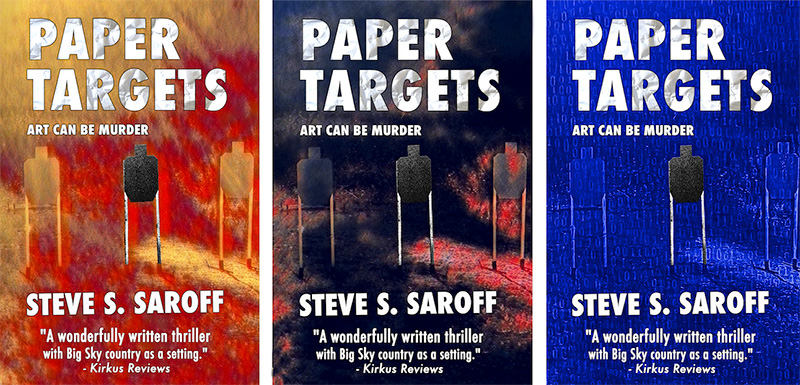
- June 2023: Paper Targets became an "Amazon Top 100 Seller," making it onto
several “Amazon Top 100 Seller”
lists, and staying on those lists for more than a month, including Psychological Literary
Fiction and Literary Fiction.
"Landing on best-seller lists has brought messages from readers wanting to know how much truth vs. fiction there is in 'Paper Targets’ … - Thank you, dear readers, here is some explanation" steve s. saroff
Paper Targets by Steve Saroff - the back story
I have severe dyslexia and did not do well in school. Then my mother died when I was ten, and my father was mostly absent. I first started running away when I was 14. This was on the east coast, near D.C. I walked up the Potomac River to where I got on the Appalachian trail at Harpers Ferry and turned south. I was hungry and lonely most of the time. For the company in words, I started writing. My dyslexia became a superpower because I listened and looked at words as sounds and shapes, not as structured rules. Dyslexia has let me notice the world in ways most people don’t. In my early 20s, I lived off the short stories I was selling to magazines. Editors fixed my grammar and spelling. Not long after I started selling fiction, I found that I also had a knack for a different type of writing: code. So I started writing software too, which is another way to deal with loneliness. And dyslexia was also an advantage for understanding code, as it helped see connections that most people missed.I started writing “Paper Targets” more than 20 years ago. The software company I founded, FreeMail, had been acquired a few years earlier, and my life should have been good. But instead, it was a Herculean mess. I had just been fired by a billionaire whom I had accused in a board meeting of crimes, and now I was out of work and broke. It would still be four more years before Ebbers was arrested and sentenced to 25 years in federal prison — where he became blind and demented — for what was then the world’s largest fraud. But when I was writing the first words of “Paper Targets,” he and the other executives who had pulled me into their world of the “Lie” were freely strutting on the World Stage of Greed. But it was all corrupt, even as they were still scooping up investor money that would evaporate into headlines. I had also recently made yet another terrible relationship decision — wanting to believe that red flags were trail markers — and had bailed an artist out of jail. And that story found a place in Paper Targets.
Writing has been my way to understanding mistakes and troubles. But whenever I try to write “Just The Facts,” my words scrunch into arrogant-sounding scribbles and add depression to my burdens. So I turn to fiction, as I have been doing since I left home at 14, to figure out what happened. And inevitably, the truth does come out; there is a lot of non-fiction in “Paper Targets,” but I have never killed anyone nor hacked for money, though I have known several that have. Then, in 2020 I became friends with Stacy Lear, a writer who was then a homicide detective and who also has a knack for solving financial crimes. I thought Stacy might appreciate what I had spent the last 20 years trying to figure out, and I read to her the first pages of what then was called “The Aether and the Lie,” some of which I had also read on my podcast Montana Voice. Stacy’s response encouraged me to finish what I had started and find a publisher for what became “Paper Targets.”
People who have created our technological world — the screens, wires, networks — are failable human beings, and some have done bad things because of greed. And others have been nudged into doing bad things because the border between right and wrong can be jagged and grey. But good still matters and ethics is more than an academic concept, and living ethically is a challenge but should be a goal.
Paper Targets fits into the shelf space of “Literary Thriller,” but I like to think of my genre as “Truth Stirred With Fiction.” A bad thriller is pure plot, and a bad literary work is pure internal insight. But when plot is mixed lovingly with insight, there’s often a good story. I’m drawn to a good story; that is what I like to read, and what I also strive to tell.
- steve s. saroff
Paper Targets
Additional Steve S. Saroff writing
- Success - a short story
- FreeMail - some of what happened
- Back story of Paper Targets
- The First Chapter of Paper Targets
- The Amazon page for Paper Targets
- The Long Line Of Elk - Poems and Artifacts
- My dyslexia
- Letter To My Daughter - a love story in Redbook (A bit about how it was published here)
- Wildhorse Island - another Redbook story
- 1972 - Leaving Home
- Jewel Boots - a short story set in Missoula
Contact Steve S. Saroff
- Website: Saroff.com
- Podcast: Montana Voice Podcast
- Instagram @SteveSaroff
- Facebook steve.saroff
- LinkedIn SteveSaroff
- Threads: @stevesaroff
- GoodReads: Steve S. Saroff
Flooding Island
Montana Voice, a Podcast, is a Flooding Island Production. All content on the MontanaVoice.com website and on the Montana Voice podcast are copyrighted. Copyright © 2000 through 2023 by Flooding Island LLC. and by the individual copyright holders. Montana Voice™, and MontanaVoice.com have been online since February 2000. The Montana Voice Podcast is also distributed through Apple Podcasts, Spotify, and wherever you listen to podcasts.
Montana Voice™, and Flooding Island™, and the Flooding Island logo are trademarks of Flooding Island,LLC.

Contact us through social media or by email: info AT floodingIsland DOT com

 Read the reviews
Read the reviews